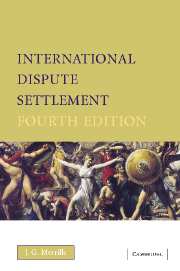Book contents
- Frontmatter
- Contents
- Preface
- Table of cases
- Table of treaties and agreements
- List of abbreviations
- List of websites
- 1 Negotiation
- 2 Mediation
- 3 Inquiry
- 4 Conciliation
- 5 Arbitration
- 6 The International Court I: Organisation and procedure
- 7 The International Court II: The work of the Court
- 8 The Law of the Sea Convention
- 9 International trade disputes
- 10 The United Nations
- 11 Regional organisations
- 12 Trends and prospects
- Appendices
- Index
3 - Inquiry
- Frontmatter
- Contents
- Preface
- Table of cases
- Table of treaties and agreements
- List of abbreviations
- List of websites
- 1 Negotiation
- 2 Mediation
- 3 Inquiry
- 4 Conciliation
- 5 Arbitration
- 6 The International Court I: Organisation and procedure
- 7 The International Court II: The work of the Court
- 8 The Law of the Sea Convention
- 9 International trade disputes
- 10 The United Nations
- 11 Regional organisations
- 12 Trends and prospects
- Appendices
- Index
Summary
When a disagreement between states on some issue of fact, law or policy is serious enough to give rise to an international dispute, their views on the matter in question may be difficult or impossible to reconcile. In such a case either or both of the parties may refuse to discuss the matter on the ground that their position is ‘not negotiable’. Alternatively, negotiations may drag on for years until one side abandons its claim or loses patience and attempts to impose a solution by force. It follows that negotiation, even if assisted by good offices or mediation, cannot be regarded as an adequate means of resolving all international disputes.
With states, as with individuals, experience demonstrates that the risks of stalemate are greatly reduced when a disinterested third party is brought into a dispute to provide the parties with an objective assessment. Internationally a number of methods of achieving this have been developed. The method with which this chapter is concerned is called ‘inquiry’.
‘Inquiry’ as a term of art is used in two distinct, but related senses. In the broader sense it refers to the process that is performed whenever a court or other body endeavours to resolve a disputed issue of fact. Since most international disputes raise such issues, even if legal or political questions are also present, it is clear that inquiry in this operational sense will often be a major component of arbitration, conciliation, action by international organisations and other methods of third-party settlement.
- Type
- Chapter
- Information
- International Dispute Settlement , pp. 45 - 63Publisher: Cambridge University PressPrint publication year: 2005
- 1
- Cited by



